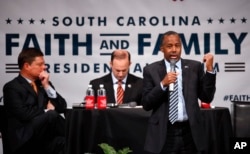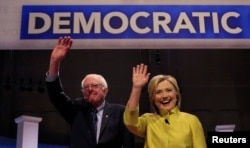U.S. presidential hopefuls are appealing to minority and evangelical Christian voters as they enter a critical two-week stretch in their campaign battle.
Four Republican candidates — former Florida Governor Jeb Bush, Florida Senator Marco Rubio, Texas Senator Ted Cruz and retired neurosurgeon Ben Carson — appeared Friday at the Faith and Family Presidential Forum at the fundamentalist Bob Jones University in Greenville, South Carolina.
Evangelicals are a key voting bloc in South Carolina, which holds its Republican primary election February 20 and its Democratic vote a week later.
Bush, a Catholic, told the forum his faith was a "guiding light" that would influence his choices in office. "I don't believe you put your faith in a lockbox in public life," he said.
Rubio addressed the problem of gun violence, which he said was a moral rather than legal issue. "When family life breaks down, values break down. And when values break down, your country breaks down," said Rubio, who is also Catholic.
Carson, a Seventh-day Adventist, addressed the issue of homosexuality, saying gay rights advocates "want to negate our faith."
"Everyone according to our Constitution should be treated equally," Carson said. "But no one gets extra rights."
Recent opinion polls showed billionaire businessman Donald Trump with a comfortable, double-digit lead in South Carolina.
Trump, who is coming off a landslide victory in New Hampshire, did not participate in the forum, but instead attacked his rivals on Twitter.
"How can Ted Cruz be an evangelical Christian when he lies so much and is so dishonest?" asked Trump, who also said Cruz was "the worst liar, crazy, or dishonest."
Cruz, one of Trump's most serious challengers, is popular with evangelicals and won the Iowa caucuses in large part with their support.
Meanwhile, the Democratic presidential candidates focused on wooing minority voters during a feisty but substantive debate Thursday in Milwaukee.
Vermont Senator Bernie Sanders and former Secretary of State Hillary Clinton clashed over economic and foreign policy as they disagreed about who would better carry on the legacy of President Barack Obama.
Clinton slammed what she said was systematic discrimination against African-Americans in housing, employment and the criminal justice system.
Sanders said race relations would be better under his administration than they have been under Obama. "Instead of giving tax breaks to billionaires, we are going to create millions of jobs for low-income kids so they’re not hanging out on street corners," he said.
Clinton, who is trying to recover from a devastating loss in this week's New Hampshire primary, polls better than Sanders nationally among nonwhite voters. She also received a key endorsement Thursday from the Congressional Black Caucus, a group representing African-American members of Congress.
African-Americans make up a majority of Democratic voters in South Carolina. Hispanics make up a considerable portion of the population in Nevada, which holds Democratic caucuses on February 20 and Republican caucuses three days later.






